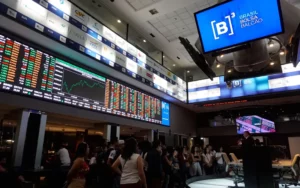The Brazilian stock market saw a decrease on Friday, with the Ibovespa index dropping by 0.99% to 127,070 points.
The main reason for this fall was Petrobras’ decision not to distribute special dividends, negatively affecting its stock and the broader market. Throughout the week, the index fell by 1.63%.
Shares of Petrobras dropped 10.57%. In contrast, shares of smaller oil companies, such as PRIO, 3R, and PetroReconcavo, climbed between 3.11% and 4.28%.
Investors shifted their funds from Petrobras to these smaller companies, leading to gains for the “oil juniors.”
Banco do Brasil’s shares also went down by 0.98%, hitting a low of about 4% during the day.

This decline was partly because the bank is state-owned and due to a meeting involving President Lula, Finance Minister Fernando Haddad, and public banks.
This meeting, aimed at boosting public banks’ support for economic growth, raised fears of more government control over these entities.
The U.S. dollar increased by 0.97% against the Brazilian real, influenced by Petrobras‘ actions and other factors like U.S. employment data and news from Congress.
By the week’s end, the dollar had risen by 0.54% against the real.
In the United States, job additions in February surpassed forecasts, with 275,000 non-farm jobs created.
However, revisions to previous months’ data showed a decrease, and there was a slight rise in unemployment and a moderation in wage increases.
Major U.S. stock indices, including the Dow Jones, S&P 500, and Nasdaq, faced declines of 0.18%, 0.65%, and 1.16%, respectively.
After the U.S. employment report’s release, the real/dollar pair showed significant volatility.
The job market in the U.S. remains robust, with unemployment staying below 4% for two years.
These developments highlight government actions’ ripple effects across markets and the broader economy, emphasizing interconnectedness.

